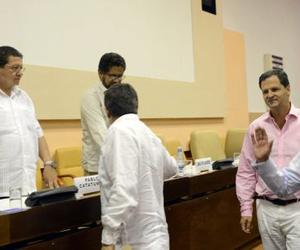Colombia, rebels reach land-reform deal in Cuba talks
- Submitted by: lena campos
- Society
- 05 / 28 / 2013

The Colombian government and the country's biggest rebel group announced an agreement Sunday on one of their main bones of contention, land reform, after more than a half year of slow-moving peace talks in Cuba's capital.
Both said the agreement constituted a major breakthrough, although several key details still needed to be worked out in the coming weeks and months. They did not release the text of the accord, but said it dealt with issues like property rights, access to land and rural infrastructure development.
"This agreement will be the start of a radical transformation of the countryside," the joint communiqué said.
The parties must now reach understandings in five other areas, starting with the political reintegration of fighters for the rebel movement, the Revolutionary Armed Forces of Colombia, another highly sensitive issue.
The two sides have stressed that no concessions are final until a complete peace accord is reached. But for one day, at least, the longtime enemies seemed optimistic an important step had been taken toward ending the half-century-long conflict.
"Today we have a real opportunity to attain peace through dialogue," said the government's chief negotiator, Humberto de la Calle.
Colombian President Juan Manuel Santos added in a tweet from Bogota: "We celebrate, truly, this fundamental step taken in Havana toward a full agreement to put an end to half a century of conflict."
Both sides say land rights lie at the heart of Colombia's conflict.
About 5 million acres of land were stolen from rural farmers by armed groups during the conflict, with twice that amount abandoned by those fleeing the violence.
The rebels say some land has also been expropriated by officials in fraudulent and corrupt processes, while the government says the FARC has also forced people off land.
Analysts and aid groups say much of the stolen land was taken by far-right paramilitary groups working in the service of ranchers and drug traffickers.
A lot of land was laundered through straw buyers and purchased by agribusiness operations that grow high-value crops for export.
Despite Sunday's deal, rebel chief negotiator Ivan Marquez said several issues surrounding land reform are unresolved.
Source. Azstarnet.com
Comments